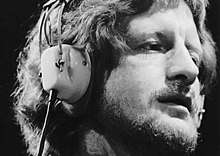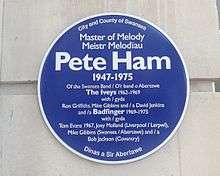Pete Ham
Peter William Ham (27 April 1947 – 24 April 1975) was a Welsh singer, songwriter and guitarist, best known as a lead vocalist of and composer for the 1970s rock band Badfinger, whose hit songs include "No Matter What", "Day After Day" and "Baby Blue". He also co-wrote the ballad "Without You", a worldwide number-one hit for Harry Nilsson that has become a standard covered by hundreds of artists. Ham was granted two Ivor Novello Awards related to the song in 1973.
Pete Ham | |
|---|---|
 | |
| Background information | |
| Birth name | Peter William Ham |
| Born | 27 April 1947 Swansea, Wales |
| Died | 24 April 1975 (aged 27) Weybridge, Surrey, England |
| Genres | |
| Occupation(s) | |
| Instruments | |
| Years active | 1961–1975 |
| Labels | |
| Associated acts | |
| Website | http://www.badfingersite.com/badfinger-bios/pete-ham/ |
Ham committed suicide in 1975, when he became depressed while embroiled in band-related issues, such as label and management problems, as well as a lack of funds.
Early life
Ham was born in Swansea, Wales. He formed a local rock group called The Panthers circa 1961. This group would undergo several name and line-up changes before it became The Iveys in 1965. The band was relocated to London by The Mojos manager, Bill Collins, in 1966, and they continued to perform for three years throughout the United Kingdom. Ham eventually became the prominent songwriter for the band, after a Revox tape recorder was made available by Collins to encourage him. Ray Davies of The Kinks took an initial interest in the group, although tracks produced by Davies did not surface commercially until decades later. In 1968, The Iveys came to the attention of Mal Evans (The Beatles' personal assistant) and were eventually signed to the Beatles' Apple Records label after approval from all four Beatles, who were reportedly impressed by the band's songwriting abilities.[1]
Badfinger
The Iveys changed their name to Badfinger with the single release of "Come and Get It", a composition written by Paul McCartney that became a worldwide top-ten hit. Ham had initially protested against using a non-original to promote the band, as he had gained confidence in the group's compositions, but he was quickly convinced of the springboard effect of having a likely hit single. His own creative perseverance paid off eventually, as his "No Matter What" became another top-ten worldwide hit in late 1970. He followed up with two more worldwide hits in "Day After Day" and "Baby Blue".[1]
Ham's greatest songwriting success came with his co-written composition "Without You" – a worldwide number-one when it was later covered by Harry Nilsson and released in 1972. The song has since become a standard and has been covered by hundreds of singers. An Ivor Novello award for Song of the Year was issued in 1973 along with Grammy nominations. George Harrison used Ham's talents for a number of album sessions, including on the All Things Must Pass album and for other Apple Records artist's recordings. This friendship culminated with Ham's acoustic guitar duet on "Here Comes the Sun" with Harrison at The Concert for Bangladesh in 1971, later portrayed in the theatrical film of the concert. In 1972, Badfinger was picked up by Warner Bros. Records, as the Apple Records label was crumbling and it seemed the band was primed for major recognition.[1]
Death
Warner Bros. Records sued Badfinger's business manager, Stan Polley, after an advance vanished and, after Polley disappeared, the band were left penniless. Believing his finances had been wiped out, Ham hanged himself in his garage three days before his 28th birthday. He left a note telling his pregnant girlfriend and her son that he loved them. It read, "I will not be allowed to love and trust everybody. This is better. Pete. PS Stan Polley is a soulless bastard. I will take him with me."[2]
Legacy

Ham is often credited as being one of the earliest purveyors of the power pop genre.[3] His most widespread effect in popular music is the ballad "Without You", written with Badfinger bandmate Tom Evans. Collections of Ham's home demo recordings have been posthumously released: 1997's 7 Park Avenue, 1999's Golders Green[1] and 2013's The Keyhole Street Demos 1966–67.[4]
On 27 April 2013, an official blue plaque was unveiled by the Swansea City Council to honour Pete Ham in his home town of Swansea. The public event was also attended by two former members of the original Badfinger band, The Iveys, Ron Griffiths and David Jenkins, plus former Badfinger member Bob Jackson. The plaque, designed by Dan Matovina, honoured Pete and all the Iveys and Badfinger members of Pete Ham's lifetime. The unveiling of the plaque was followed by a concert featuring former Badfinger members Bob Jackson and Al Wodtke.[5]
Discography
- 7 Park Avenue (1997)
- Golders Green (1999)
- The Keyhole Street Demos 1966–67 (2013)
Ham also appeared as a guest artist on
- The Concert for Bangladesh (the concert, the album, and the film)
- All Things Must Pass by George Harrison (album)
- "It Don't Come Easy" by Ringo Starr (single)
- "Try Some, Buy Some" by Ronnie Spector (single)
- Living in the Material World (uncredited[6]) by George Harrison (album)
Charted singles
- "No Matter What" (Billboard charting number 8, by Badfinger)
- "Without You" (Billboard charting number 1 by Harry Nilsson, number 3 by Mariah Carey, number 28 by Clay Aiken).
- "Day After Day" (Billboard charting number 4, Cash Box charting number 1, both by Badfinger)
- "Baby Blue" (Billboard charting number 14 by Badfinger)
See also
- 27 Club, of which Ham is a member
References
- Matovina, Dan. Without You: The Tragic Story of Badfinger, Google Books, 2000. Retrieved 10 October 2008
- Clark, Nick (April 26, 2013). "Badfinger: last act in a rock'n'roll tragedy". The Independent.
- "All Music, Power Pop".
- "Pete Ham of Badfinger". PledgeMusic. Archived from the original on 15 October 2014. Retrieved 27 September 2014.
- "Badfinger's Pete Ham: Beatle widow Olivia Harrison joins plaque tributes". BBC News. 27 April 2013. Retrieved 27 April 2013.
- "Badfinger Biography Pages – Without You:The Tragic Story". Mindspring.com. Archived from the original on 5 April 2007. Retrieved 27 September 2014.